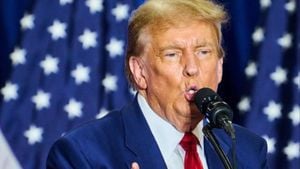North Korea's involvement in the Russia-Ukraine conflict marks a significant escalation, as troops from the Pyongyang regime have officially joined the fray, raising alarm bells among global officials. This unprecedented move, which has unfolded since late October 2024, signifies more than just foreign military support; it reflects the deepening ties between Russia and North Korea and the shifting dynamics of international relations.
Recent reports indicate North Korean troops have deployed to Russia’s Kursk region, where they engaged with Ukrainian forces for the first time. According to skeptical Ukrainian and U.S. officials, this initial engagement occurred alongside Russia's 810 Separate Naval Infantry Brigade, aimed at gauging Ukrainian defenses. While the exact timing and details of casualties remain vague, U.S. intelligence suggests many North Korean soldiers were lost during this clash.
Ukrainian officials estimate the total number of North Korean troops dispatched by Kim Jong-un to be around 10,000, part of a strategy to reinforce Russian military efforts amid significant losses faced by the Kremlin since the war began. President Volodymyr Zelensky remarked on the gravity of this partnership, declaring, "The first battles with North Korean soldiers open a new page of instability in the world.” He called upon international allies to provide greater support to counter this new threat.
North Korea’s entry as a combatant was preceded by months of strategic meetings between Kim and Russian President Vladimir Putin. The two leaders signed a mutual defense treaty, which emphasizes military cooperation. This partnership has evolved to include provisions for mutual assistance if either nation faces aggression.
Western officials remain concerned about the political calculus underlying this military cooperation. With North Korea's potentially outdated capabilities and significant troop numbers, the deployment could signal desperation on Russia's part, rather than strength. The Kremlin positions this collaboration as evidence of its continued global influence, countering perceptions of isolation following its invasion of Ukraine.
Particularly concerning for nearby nations, this development could escalate tensions surrounding the Korean Peninsula and within East Asian diplomatic relations. South Korea, observing this newfound military alliance as "a grave security threat,” has expressed outrage at the potential normalization of North Korea's military engagement on foreign soil. The South Korean government has stated it might take “phased countermeasures” to address this growing alliance, prompting dialogue about increasing military support to Ukraine.
Indeed, military cooperation between Russia and North Korea appears more than just logistical; it includes the transfer of weapons and military technology. Since 2023, reports suggest North Korea has supplied Russia with thousands of shipping containers filled with various munitions. This influx of resources has been pivotal for Russia's military operations, especially as it looks to replenish its arsenal after suffering substantial casualties, estimated at 600,000 personnel since February 2022.
The ramifications of North Korea's participation extend beyond immediate military objectives. Analysts fear this direct involvement could shift the conflict from being merely regional to something with the potential for worldwide impact. The prospect of North Korean forces fighting alongside Russian troops raises questions about the potential for larger international confrontations, with complexity increasing due to existing alliances.
Reports of North Korean troops mingling with Russian forces have prompted debates about whether this marks the beginning of expanded, direct military actions involving multiple nations. Both American and European officials remain vigilant, assessing the strategic threats posed by North Korean involvement and how the West should respond.
Adding to the concerns is the possibility of North Korea receiving military technologies, including advancements within its nuclear and missile programs, from Russia. This transfer could fundamentally alter the balance of regional power dynamics, creating new security challenges not just for the countries directly involved but also for global actors.
Some analysts liken North Korea's current military involvement to historical instances, such as South Korea's commitment of troops to the Vietnam War, which sought to bolster U.S. interests. While North Korea aims to leverage Russian dependence to gain negotiating power, the potential for such entrenched military cooperation poses substantial risks.
Recent developments have underscored the urgent need for proactive diplomatic responses. Zelensky, calling on the world to confront this new frontier of military cooperation, highlighted the vulnerability faced by Ukraine, stressing the need for long-range weaponry to effectively counter the threat.
Meanwhile, the Kremlin downplays fears, asserting their partnership with North Korea does not threaten the security of South Korea. Nonetheless, worries persist about the underlying conditions enabling third-party military involvement and the long-term consequences on global peace and stability.
Discussions on how to tame the complexity arising from mutual military support between Russia and North Korea are increasingly urgent. Officials from various allied nations watch warily, acknowledging the need for numerous strategic adjustments as the situation escalates.
Going forward, the military dynamics of the Ukraine conflict will shift under this new layer of complexity, with North Korea's role being closely monitored. Both sides are preparing for potential larger confrontations, as alliances reshape their strategies based on new threats and opportunities. With each shift, the future of the region—and echoes beyond—hangs precariously in the balance.



